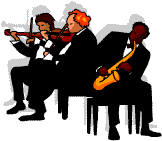The Promenade Concerts
Created | Updated Jun 13, 2008

The Promenade Concerts comprise a fabulous feast of music provided annually by the BBC. They were started in 1895 by the manager of the newly built Queen's Hall in London; Robert Newman. His intention was to provide a series of concerts which would be more accessible to the general public by offering more popular programmes, keeping ticket prices low, and allowing the audience to 'promenade' or walk around the arena or 'well' of the venue.
Henry Wood
Henry Wood had already made a name for himself as an organist, accompanist, vocal coach, and conductor of choirs, orchestras, and amateur opera companies. His task, as Robert Newman described it, was to:
... run nightly concerts to train the public in easy stages: popular at first, gradually raising standards, until I have created a public for classical and modern music.
Wood jumped at the chance, and was given the permanent conductorship at Queen's Hall. The series was known as 'Mr Robert Newman's Promenade Concerts', and each concert lasted a generous three hours. The informal spirit was encouraged by keeping the ticket prices very low: one shilling (5p) for a single performance, or a guinea (£1.05) for a season ticket. Eating, drinking, and smoking were permitted, although patrons were asked not to strike matches during vocal numbers.
The series proved to be a great success, with the pattern established of performing the more 'serious' items in the first half and the more adventurous, or new works, appearing after the interval. Wagner and Beethoven nights were introduced, and new works by young, talented performers were encouraged and promoted. By 1920, Wood had introduced to the Proms many of the leading composers of the era, including Richard Strauss, Debussy, Rachmaninov, Ravel, and Vaughan Williams.
During the First World War, all things German were discouraged, if not actually vilified, but Wood and Newman insisted that:
The greatest examples of Music and Art are world possessions and unassailable even by the prejudices of the hour.
The Proms ran into financial problems in 1927 when the music publishers Chappell and Co withdrew their support. Fortunately the BBC had just established their charter to 'Inform, educate and entertain'. It was natural, therefore, that they would take over the Proms, and produce concerts by Sir Henry Wood and his Symphony Orchestra for three years. They continued to do this until the formation of the BBC Symphony Orchestra in 1930.
The Proms again hit problems during the Second World War, due to the BBC being unable to offer support and the Queen's Hall being gutted by bombing on 10 May, 1941. After the bombing, the Proms transferred to the Royal Albert Hall, an impressive building opened in 1871 and named in honour of Albert, the Prince Consort, husband of Queen Victoria. By 1944, the Proms had reached their 50th season, and Henry Wood had reached the age of 75. He conducted his last concert on 28 July, and died three weeks later.
Malcolm Sargent
The concerts continued after the war under the watchful eye of Malcolm Sargent, known as 'Flash Harry' by fans and orchestra members alike... but only behind his back! The programmes were extended first to other orchestras from England then, in 1966, to guest orchestras from around the world. It was this openness to new music and new performers, and the willingness to experiment with programmes, which expanded the Proms from a fairly conservative endeavour into the internationally popular music festival it has become today.
Into the Next Millennium
1996 saw the introduction of Proms in the Park, Proms Chamber Music, and the Proms Lecture; the latter proving itself to be invaluable to music students. The year 2000 saw the start of Poetry Proms, a new venture for a new millennium.
Ticket prices are still kept to an affordable price, the most popular tickets being the ones which allow the concert-goer to 'promenade'. Queuing is advisable for the more popular concerts, and be prepared to camp out in the street to gain entrance to the 'Last Night'. Seats for this concert are only obtainable by entry in a bizarre 'lottery', at least half a year before, so it is advisable to apply early.

